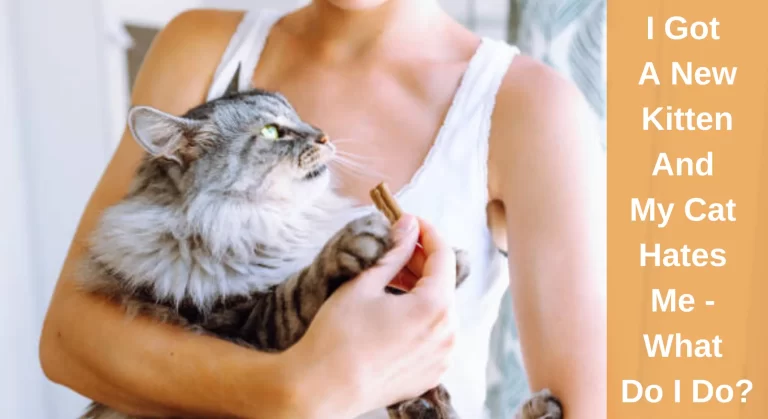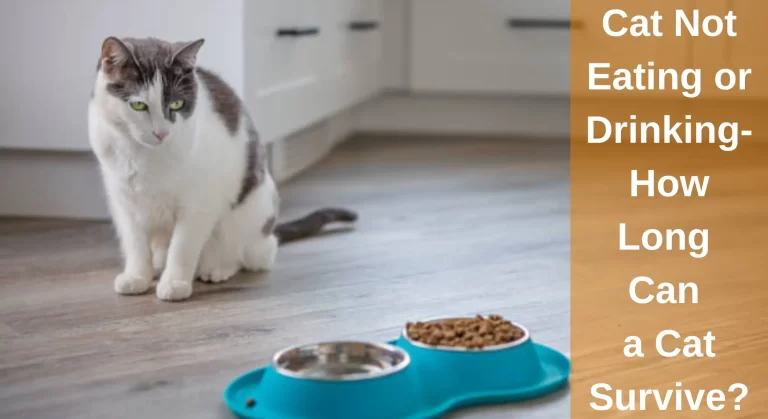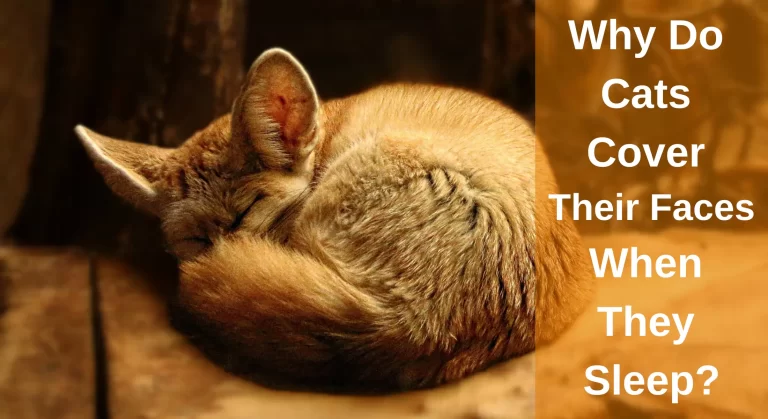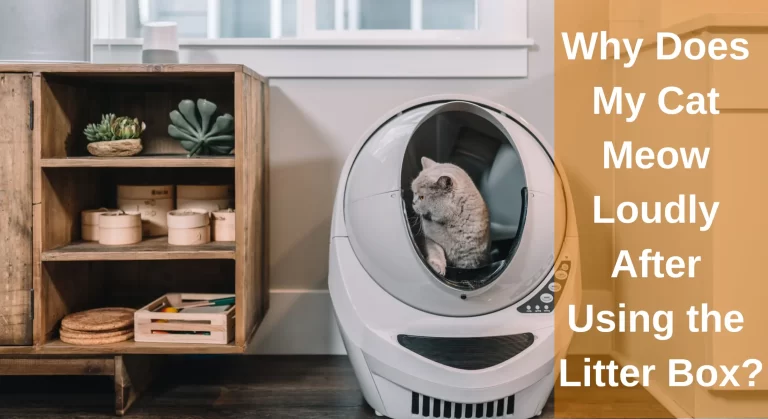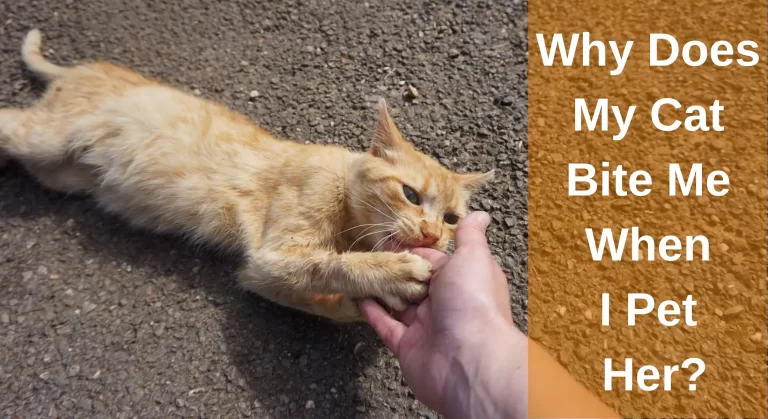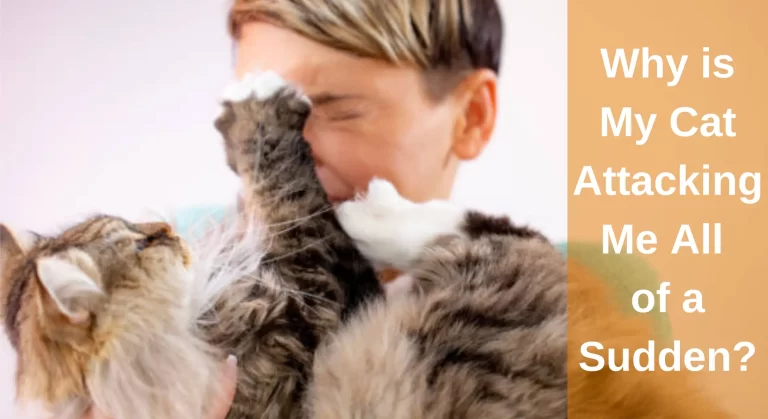Why Is My Cat Hissing at Other Cat After Vet – How To Stop Catfight?
We love cats because of their companionship and joy in our lives. However, they can also exhibit strange and unsettling behaviors, such as Cat hissing at other cat after vet visits. It can be concerning for pet owners to see their cats behave this way, especially if they have gotten along with them in the past.
Your cat hisses at your other cat after going to the vet or, for that matter, after any time away from home because of feline non-recognition aggression.
In this article, we will explore the reasons why your cat may be hissing at their feline friend after a vet visit and what you can do to help them get along.
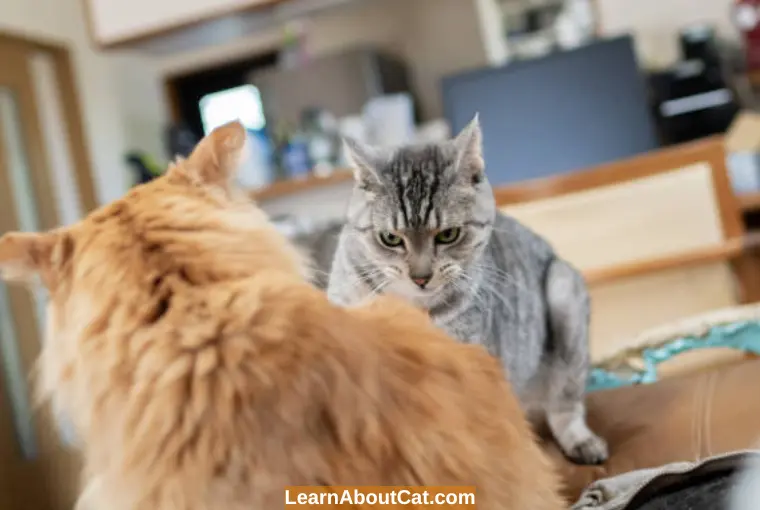
What is Feline Non-Recognition Aggression?
This happens when your other cat gets home and doesn’t recognize it. They view your cat as an annoyance and an intrusion into their privacy.
Feline non-recognition aggression, also known as “displaced aggression,” is a type of aggressive behavior that occurs when two cats who previously knew each other suddenly fail to recognize each other as familiar. This can happen after one cat has been away for a while, such as after a visit to the vet or being boarded, or after a major change in the environment, such as moving to a new home.
When the two cats are reunited, the cat who stayed home may hiss, growl, or attack the returning cat, even though they previously got along well. This aggression is thought to be due to the returning cat carrying unfamiliar scents that the resident cat perceives as a threat.
Cats hate it when people or other animals enter their domain. Take into account whether your first cat protested when you first brought your new cat home. It is quite common for cats to feel melancholy when a new kitten is introduced to the home. You must have put a lot of work into it to convince your cat to stop hissing at the new kitten.
However, this original dynamic is effectively reset if your cat doesn’t recognize your other cat when you arrive home. It resembles bringing a brand-new kitten home in terms of how it feels. In fact, the new resident of the home is frightening to your cat.
Reasons Why Are My Cats Fighting After Vet Visits
There are several reasons why your cat may be hissing at other cats after a vet visit. Feline non-recognition aggression is the root cause of your cat’s hissing and other hostile behaviors.
Your cat smells different because when your cat goes to the vet, they are exposed to new smells and other animals. This can cause your cat’s scent to change, which can make them unrecognizable to other cats in the household.
But hold on, how can a cat completely forget its closest friend after only a short time apart?
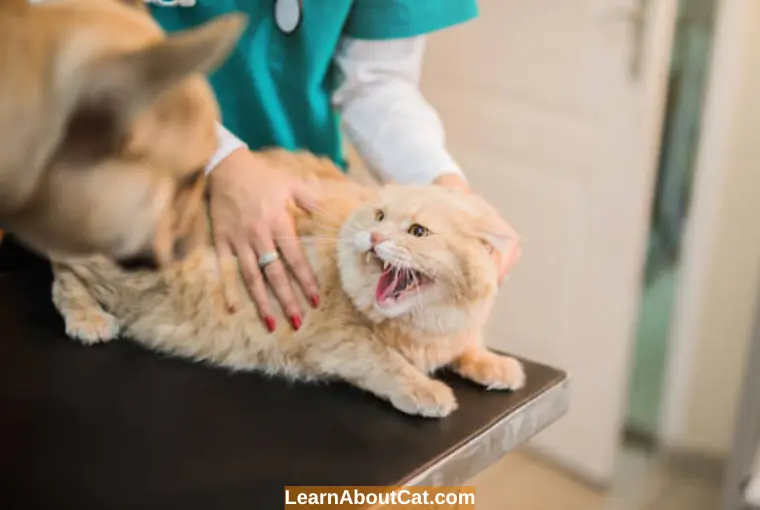
1. Change in Scent
Cats rely heavily on their sense of smell to recognize and communicate with each other. Their sense of smell is fourteen times as acute as ours. As a result, it is thought that cats identify other cats by their fragrance rather than their outward look.
Cats from the same household will have the same scent. Your cat might not smell the same when it gets home from the clinic.
When one cat returns home from the vet, it may smell different due to the medications, anesthesia, and other treatments it receives. This change in scent can confuse or threaten the other cat, leading to hissing and aggression.
Here are some instances of how your cat’s scent has changed:
- Stress Pheromones: The majority of cats dislike going to the vet. Your cat’s anal sacs will release stress pheromones as a result of this unpleasant experience(the cat bit and attacked me). When you return home, your second cat will be able to smell these stress hormones and will assume that there is probably danger nearby. They could become antagonistic as a result.
- Changes in Hormones: As sick cats’ bodies work to recover from illness, their hormone levels will fluctuate drastically. Given that cats have such acute senses of smell, your other cat may be able to notice these changes. This one hides the family scent, so your other cat won’t recognize them.
- Vet Odours: Your cat could also have a veterinary-like odor when it gets home. For instance, they could smell like someone who used alcohol, medication, cleaning products, or disinfectants. Because of this, your other cat won’t recognize your cat.
2. Protective Behaviour
Cats are territorial animals and may feel that their space has been invaded when another cat returns from the vet. They may hiss and display aggressive behavior to protect their territory if they feel threatened.
3. Pain or Discomfort
Your cat may be in pain or discomfort after a vet visit. Cats are masters at hiding pain and may not show any signs of discomfort until they are around other cats. If your cat is feeling unwell, it may be more irritable and more likely to hiss at other cats.
4. Disorientation and Stress
A visit to the vet can be a stressful experience for cats, especially if they receive injections, blood tests, or other invasive procedures. They may feel disoriented or scared when they return home, and this can cause them to lash out at their feline friends.
Also Read: Do Cats Get Mad At You? Signs
How to Stop Cat Aggression After a Vet Visit?
If your cat is hissing at other cats after a vet visit, there are several things that you can do to help them feel more comfortable.
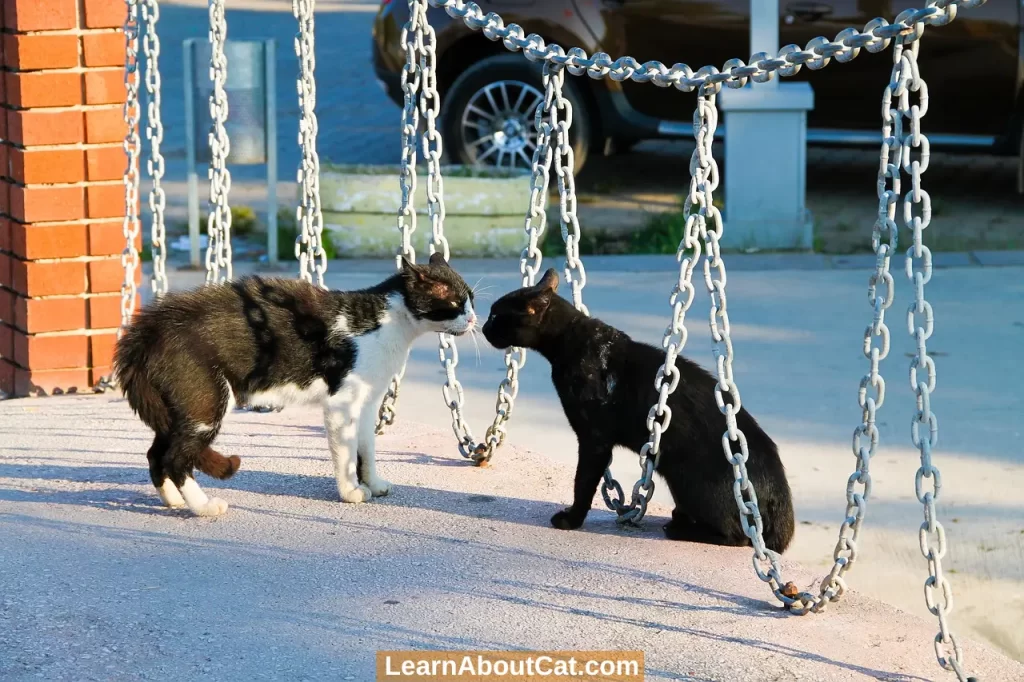
1. Separate Your Cats
The fact that ill cats smell differently is one of the reasons your cat may not be familiar with your other cat. It is recommended that you keep your cats apart after a vet visit in order to avoid fights. This is particularly important if one of your cats has had a procedure that requires some recovery time.
Keep them separated in different rooms with food, water, and litter boxes until they have calmed down. Their hormones and sick fragrance will fade as they recover, making them simpler to spot.
2. Creating a Safe and Calm Environment
Creating a safe and calm environment for your cats is crucial to preventing aggression. Before bringing your cat home from the vet, make sure to clean the carrier thoroughly to remove any odors that may cause stress.
Upon returning home, create a safe space for your cat where they can rest and recover from their vet visit. This space should be quiet, comfortable, and away from other pets and children.
3. Feliway Diffusers
Feliway diffusers are synthetic pheromones that mimic the natural pheromones cats use to communicate with each other.
They can be effective in reducing stress and anxiety in cats, particularly during times of disruption, such as a vet visit.
You can create a stress-free and calming environment for your cats by using Feliway diffusers in your home
4. Gradual Reintroduction
When reintroducing your cat to the other cats in the household, it’s important to take a gradual approach. Separate the cats for a few days to get reacquainted with each other’s scent, sniffing each other through a closed door. It’s a good idea to switch their living spaces after a few days so they can explore each other’s spaces.
To help your cats recognize each other’s scents, exchange blankets or toys between them after a vet visit. This can help them adjust to each other’s altered scent and prevent fights.
Finally, supervise their interactions when reintroducing them, and make sure to reward positive behavior.
Intresting Reading: How to Stop My Cat From Bullying My Other Cat?
5. Give Special Care
Make sure to give each cat a special meal during the initial reintroduction, such as canned cat food, and give them space in between. Put some unusual items between the cats, such as catnip-dusted cardboard boxes, paper bags, or toys.
6. Make a New Community Aroma
Some cat owners find that giving both of their cats the same new shared scent works better. The cats’ scents will still be similar, making it simpler for them to identify one another as family.
Just make sure the perfume you choose is powerfully fragrant, cat-safe, and cat-pleasant. Tuna liquid can be used for this purpose. Contact both cats with your hands after squeezing some tuna juice into them to disperse the scent.
7. Be patient with the Reintroduction
The most important thing is to be patient while reintroducing your cats. When you bring your cat home from the clinic, keep in mind that your other cat might be aggressive.
Cats, for example, will arch their backs when they are scared or trying to guard something. They’ll also have huge eyes, flattened ears, and floppy tails. Pay attention to the first signs of conflict to head them off before they arise.
8. Plan Veterinary Visits
This modification is simple yet effective. The same staff will treat both of your cats when they visit the vet simultaneously, and they will all wait in the same waiting area with other animals. They are exposed to the same cleaning solutions, disinfectants, etc.
This suggests that your cats will be able to identify these smells when they return home. They will be able to recognise each other for who they are despite any lingering odours from the vet.
9. The Family Scent is All Over
Every cat in a household emits the same family fragrance. This helps your cats discern between allies and foes. You can help your cat restore the family scent so that your cat who has stayed at home will be able to recognise it.
To do this, gently clean your cat’s face with a towel while your cat is inside. The glands on cats’ cheeks create a lot of pheromones. Massaging this location will transmit the pheromones and the family scent to the towel.
10. Brush and Bathe Your Cat
You may help your cat get rid of the strange veterinarian odours by brushing and cleaning them after their appointment with the doctor. Most cats like being brushed, and it could even aid in their relaxation following a stressful visit to the vet.
11. Playtime and Exercise
Playtime and exercise are essential for keeping cats happy and healthy. It can also help reduce aggression between cats. Providing your cats with toys and scratching posts can help them release pent-up energy and frustration.
Additionally, providing your cats with a high perch or window perch can give them a place to escape and relax.
How Do I Deal With Catfights?
Here are some ideas foto managing catfights:
- Never let your cats fight each other! Stress and trauma could result from this. Instead, try to stop the fight by clapping your hands or launching a water cannon at the cat. As a consequence, the cats could cease fighting, enabling you to separate them.
- Give the cat time to calm down by removing it to a separate room. Avoid picking up your cat while doing this to prevent scratches from them.
- Give your second cat, the one that just returned from the vet, room to run and hide. This is a typical response to stress, and trying to soothe your cat too quickly can worsen things. Allow them to come to you, and be there for them anytime they require it.
- You can reintroduce the cats once they’ve both cooled down. Generally speaking, it’s wise to implement this gradually. For instance, you can feed them on multiple screen door sides. Once they look to be at peace like this, you may gradually permit them to spend more time together.
Check Out: Can Cats Kill Each Other?
Why is My Cat Mistreating My Other Cat after seeing the Vet?
Medications and medical procedures may change a cat’s fragrance. Because of this, when the absent Kitty returns home, the other house cats don’t recognise him (According to Scientific American, cats forget other cats when they are separated for a long time) and react to the strange odours as though an alien cat has intruded on their territory. Then, they may act opportunistically to expel the invader.
Frequently Asked Questions
Why do cats bash each other?
When cats groom and sleep together, their individual odours blend. If someone is gone for a long time or even only lightly touched by a stranger, the fragrance cannot be recognised. Because of the continual petting by veterinarians, Kitty’s fur has an odd smell. So bashing occurs.
Is it normal for cats to hiss at each other after a vet visit?
Yes, it is normal for cats to hiss at each other after a vet visit. The change in scent and the stress of the experience can cause cats to exhibit aggressive behavior toward their feline friends.
How long does it take for cats to get used to each other after a vet visit?
After a vet visit, it can take several days for cats to get used to each other. Allow them to have their own separate space and gradually reintroduce them to each other while monitoring their behavior.
Should I punish my cats for hissing at each other after a vet visit?
No, punishing your cats for hissing at each other after a vet visit is not recommended. This can increase their stress levels and worsen their behavior. Instead, try to provide a calm and peaceful environment for them to readjust and get used to each other’s scents.
What is Hissing?
Hissing is a common behavior in cats that are usually associated with fear or aggression. It is a way for cats to communicate that they feel threatened or uncomfortable. Hissing is often accompanied by other behaviors such as growling, arching the back, and raising the fur on the back.
Final Thoughts!
Non-recognition aggression arises when cats are divided up and don’t seem to remember one another when they reconnect, making the hostile cat act as though the returning cat is an intruder. These include snarling, hissing, and refusing to share the water bowl or other resources, among other hostile cat behaviors.
Cat aggression is a common problem that can be caused by various factors, including scent confusion, territorial disputes, and anxiety. If your cats have started fighting after a visit to the vet, it is important to give them some space and time to readjust to each other’s scents.
If necessary, providing your cats with plenty of resources and seeking the help of a professional cat behaviorist can also help prevent and manage cat aggression. Creating a comfortable and stress-free environment for your cats can help ensure they live happy and peaceful lives.
When the situation is more serious, it could take the cats anything from a few hours to a few weeks to fully recover.
Who is Isabella?
My name is Isabella, and I am a dedicated and knowledgeable cat enthusiast. With years of experience caring for cats and a deep love for felines, I made a mission to help other cat lovers navigate the challenges of cat ownership.

